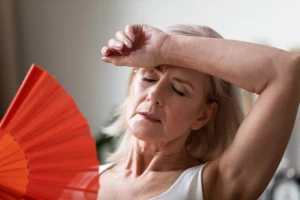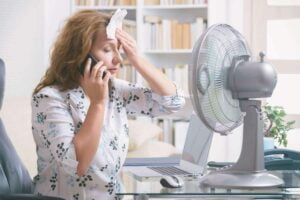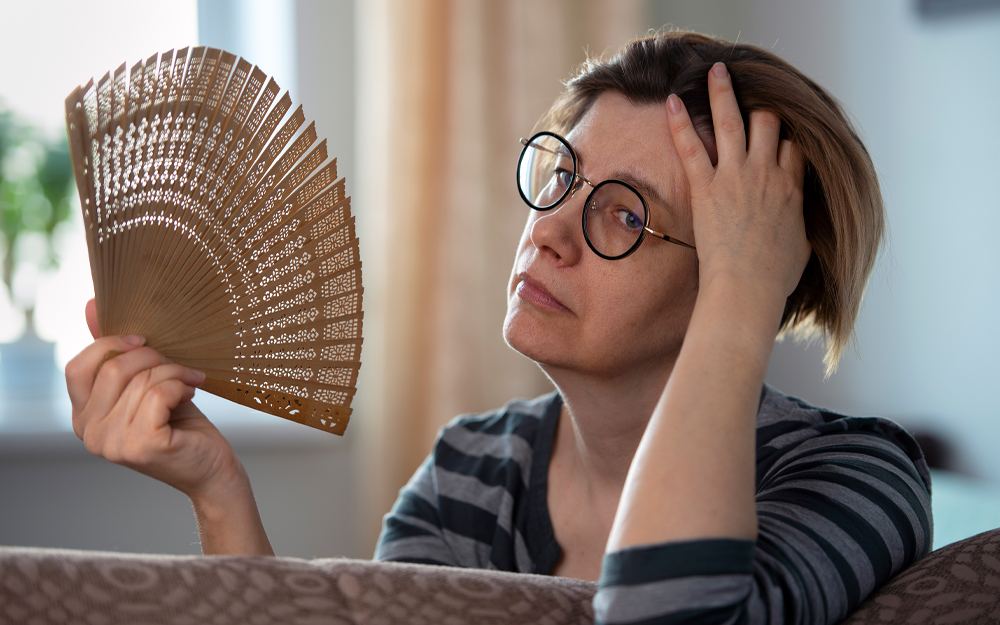As women approach menopause, they often find themselves grappling with a range of symptoms that accompany this transformative phase of life. Among these, hot flashes stand out as a common and often challenging experience. Characterized by sudden feelings of intense heat, sweating, and a rapid heartbeat, hot flashes can disrupt daily life and affect overall well-being. In this blog, we will explore the ins and outs of hot flashes menopause treatments, shedding light on some lifestyle changes to help women reclaim control and find relief.
Contents
What Are The Impacts Of Hot Flashes During Menopause?

Hot flashes are one of the most common and disruptive symptoms experienced by women during menopause. These sudden, intense feelings of heat, often accompanied by sweating and a rapid heartbeat, can have a significant impact on various aspects of a woman’s life. Here are some of the key impacts of hot flashes during menopause:
- Disruption of Daily Activities
Hot flashes can strike at any time, causing an immediate and sometimes overwhelming sensation of heat. This sudden discomfort can disrupt daily activities, work, and social interactions.
- Sleep Disturbances
Many women experience hot flashes, particularly at night, leading to night sweats. These disruptions can result in poor sleep quality and insomnia, contributing to fatigue and irritability.
- Impact on Emotional Well-Being
The physical discomfort and unpredictability of hot flashes can take a toll on emotional well-being. Women may feel anxious, frustrated, or embarrassed, especially in social situations where a hot flash occurs unexpectedly.
- Decreased Quality of Life
The cumulative effect of disrupted sleep, emotional distress, and interference with daily activities can lead to an overall decreased quality of life for women experiencing frequent and severe hot flashes.
- Reduced Sexual Satisfaction
Hot flashes and night sweats can disrupt intimacy and sexual activity. The discomfort and associated stress may contribute to a decrease in sexual satisfaction and interest.
- Workplace Challenges
Hot flashes can be particularly challenging in a work environment. Women may find it difficult to focus during meetings or presentations, and the need to manage symptoms discreetly can add a layer of stress.
- Physical Discomfort
Beyond the heat sensation, hot flashes can cause physical discomfort such as sweating, flushing, and a rapid heartbeat. These sensations can be distressing and contribute to the overall negative impact on well-being.
It’s important for women experiencing significant impacts from hot flashes to seek support from healthcare professionals. Various treatment options can help manage and alleviate the effects of hot flashes during menopause, improving overall quality of life.
What Are Some Hot Flashes In Menopause Treatment?
 Several medical treatments are available to help manage hot flashes during menopause. It’s essential to note that the effectiveness of these hot flashes menopause treatments can vary from person to person, and the choice of treatment may depend on individual health factors and preferences. Here are some common hot flashes in menopause treatment:
Several medical treatments are available to help manage hot flashes during menopause. It’s essential to note that the effectiveness of these hot flashes menopause treatments can vary from person to person, and the choice of treatment may depend on individual health factors and preferences. Here are some common hot flashes in menopause treatment:
Hormone Replacement Therapy (HRT)
Hormone replacement therapy involves supplementing the declining levels of estrogen and, if needed, progesterone in women experiencing menopausal symptoms. HRT is highly effective at relieving hot flashes, night sweats, and other menopausal symptoms. However, its use requires careful consideration of individual health factors, as it has been associated with potential risks, such as an increased risk of blood clots, stroke, and breast cancer.
SSRIs & SNRIs
These antidepressant medications, including paroxetine (SSRI) and venlafaxine (SNRI), have shown efficacy in reducing the frequency and severity of hot flashes. While their exact mechanism of action in managing hot flashes is not fully understood, they are believed to influence neurotransmitters in the brain that play a role in temperature regulation. These medications may be particularly useful for women who cannot or choose not to use hormonal treatments.
Gabapentin and Pregabalin
Originally developed to treat seizures and nerve pain, gabapentin and pregabalin are effective in reducing hot flashes. Their exact mechanism for managing hot flashes is not well understood, but they may influence the central nervous system. These medications are sometimes prescribed when hormonal treatments are not suitable or are not preferred.
Clonidine
Clonidine, typically used to treat high blood pressure, has been shown to reduce the frequency of hot flashes. It works by affecting the central nervous system and may help regulate blood vessels and reduce the intensity of hot flashes. Clonidine is available in both oral and patch forms.
Low-Dose Antidepressants
Low doses of certain antidepressants, such as fluoxetine or citalopram, may be prescribed to manage hot flashes. These medications, similar to SSRIs and SNRIs, affect neurotransmitters and can help regulate body temperature. The use of low-dose antidepressants for hot flashes is considered an off-label application, meaning it is not the primary intended use of these medications.
Ospemifene
Ospemifene is a selective estrogen receptor modulator (SERM) approved for treating painful intercourse due to vaginal dryness in postmenopausal women. While its primary indication is not for hot flashes, some studies suggest it may have a modest effect on reducing their frequency. It is an option for women who cannot or prefer not to use hormonal treatments.
Brisdelle (Paroxetine Mesylate)
Brisdelle is a non-hormonal prescription medication specifically approved for the treatment of moderate to severe hot flashes associated with menopause. It contains paroxetine, an SSRI, and its use is intended solely for managing hot flashes. Like other medications, it should be used under the guidance of a healthcare provider.
It’s important to note that individual responses to hot flashes in menopause treatments can vary. Regular follow-ups with a healthcare professional are crucial to monitor the effectiveness of the chosen treatment and address any potential side effects or adjustments needed.
How Lifestyle Changes Can Help In Hot Flashes In Menopause?
 Lifestyle changes play a crucial role in managing hot flashes during menopause. While medical treatments can be effective, incorporating certain lifestyle adjustments can help reduce the frequency and severity of hot flashes. Here are some examples that you must consider:
Lifestyle changes play a crucial role in managing hot flashes during menopause. While medical treatments can be effective, incorporating certain lifestyle adjustments can help reduce the frequency and severity of hot flashes. Here are some examples that you must consider:
Dietary Modifications
Certain foods and beverages can trigger hot flashes. These may include spicy foods, caffeine, alcohol, and hot drinks. Keeping a food diary can help identify specific triggers, and adjusting the diet accordingly may alleviate symptoms. And, a well-balanced diet with adequate intake of fruits, vegetables, whole grains, and lean proteins can contribute to overall health and may positively influence menopausal symptoms.
Regular Exercise
Engaging in regular physical activity can help regulate hormonal fluctuations and improve overall well-being. Exercise has been shown to reduce the frequency and intensity of hot flashes. Aim for at least 150 minutes of moderate-intensity aerobic exercise per week, along with strength training exercises.
Weight Management
Maintaining a healthy weight is associated with a lower risk of experiencing severe hot flashes. Weight management through a combination of regular exercise and a balanced diet can contribute to symptom relief.
Stress Reduction Techniques
Stress is a known trigger for hot flashes. Practices such as mindfulness meditation, deep breathing exercises, yoga, and progressive muscle relaxation can help reduce stress and improve the overall response to menopausal symptoms.
Cooling Strategies
Dressing in layers allows for easy temperature regulation. Wearing lightweight, breathable fabrics and using fans or cool compresses can help manage body temperature and reduce the discomfort associated with hot flashes.
Hydration
Staying well-hydrated is important, but it’s advisable to avoid drinks that can trigger hot flashes, such as caffeinated beverages and alcohol. Opt for water and herbal teas as hydrating alternatives.
Quit Smoking
Smoking is associated with an increased risk of hot flashes and other menopausal symptoms. Quitting smoking not only improves overall health but may also contribute to a reduction in the frequency and severity of hot flashes.
Regular Sleep Patterns
Establishing and maintaining a regular sleep routine can improve sleep quality and reduce the impact of night sweats. Keep the bedroom cool and comfortable, and consider using moisture-wicking bedding.
Acupuncture and Acupressure
Some women find relief from hot flashes through acupuncture or acupressure. These alternative therapies involve stimulating specific points in the body, and while more research is needed, some women report a reduction in symptoms.
Women experiencing severe or persistent hot flashes should consult with their healthcare provider. They will help to develop a comprehensive management plan that may include a combination of lifestyle modifications and medical treatments. Additionally, healthcare providers can offer personalized guidance based on individual health history and preferences.
Conclusion
In conclusion, managing hot flashes during menopause involves a holistic approach that combines medical treatments and lifestyle adjustments. While medications like hormone replacement therapy and antidepressants can offer relief, incorporating simple lifestyle changes can make a significant difference. Adopting a balanced diet, staying physically active, managing stress through relaxation techniques, and implementing cooling strategies can help women navigate the challenges of hot flashes.
Each person’s experience is unique, so it’s essential to work closely with healthcare providers to find a personalized solution that addresses individual needs and preferences. By embracing a comprehensive approach, women can reclaim control, improve their quality of life, and transition through menopause with greater comfort and confidence. If you are facing menopause related issues, menopause treatment at HerMantra can help. Book your free trial online menopause treatment session now.


